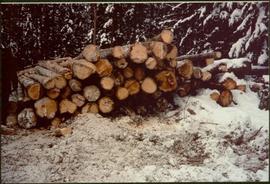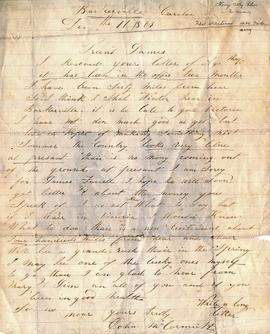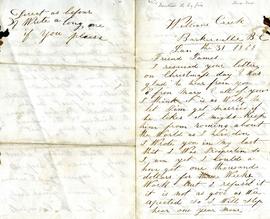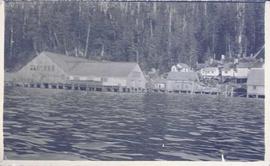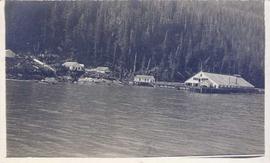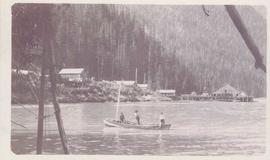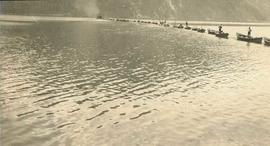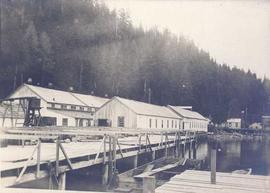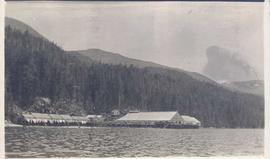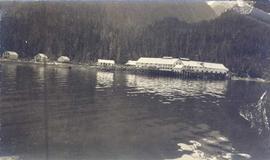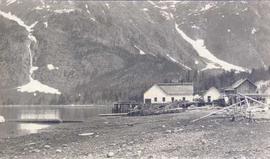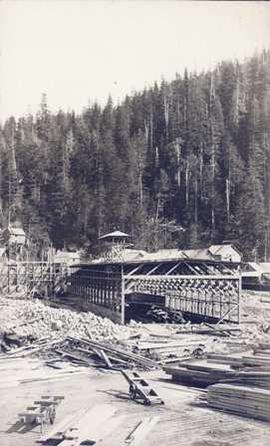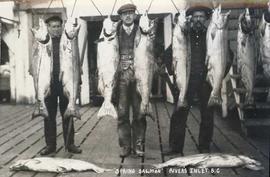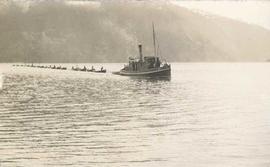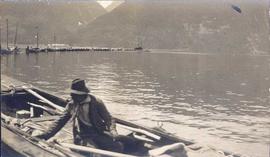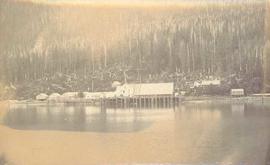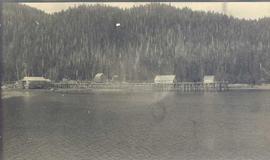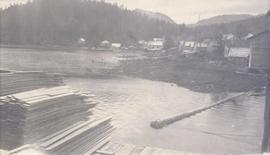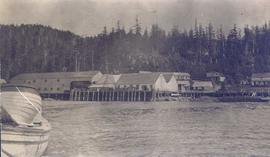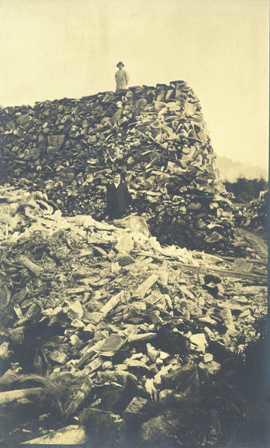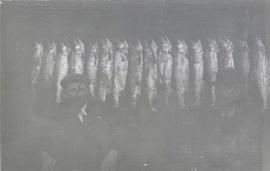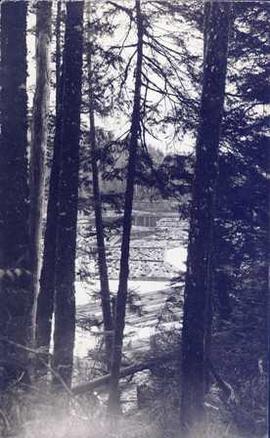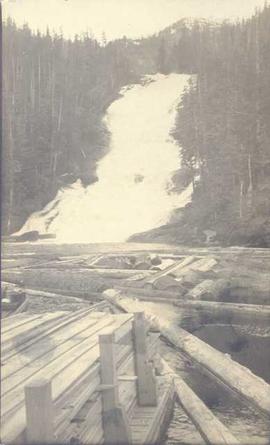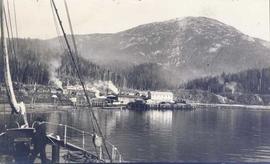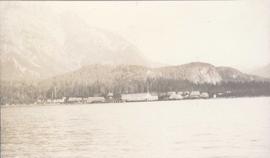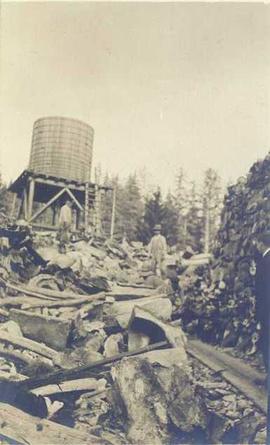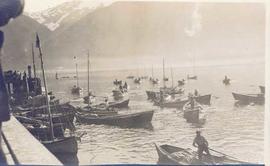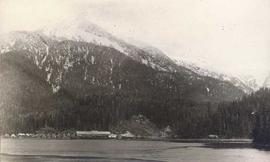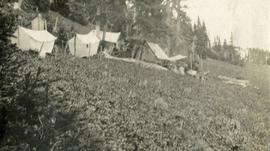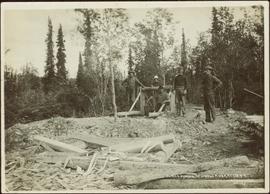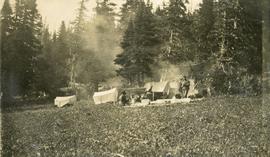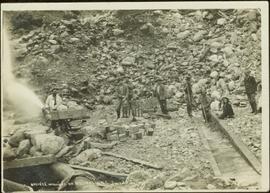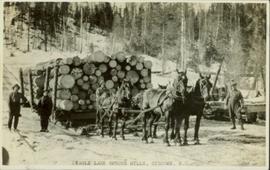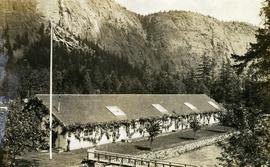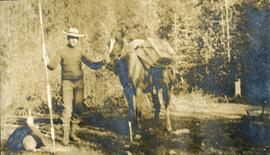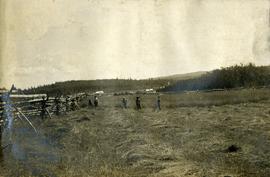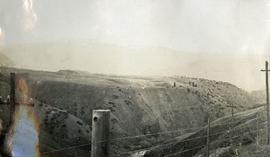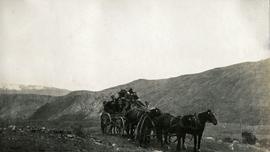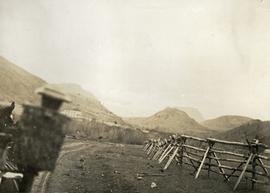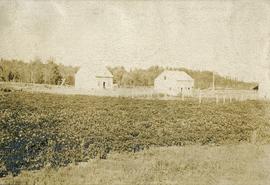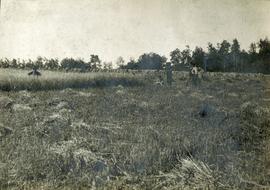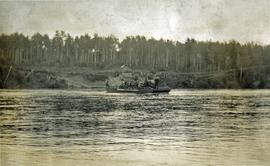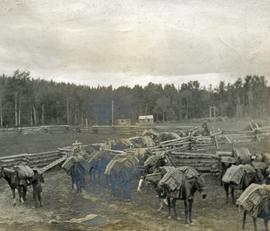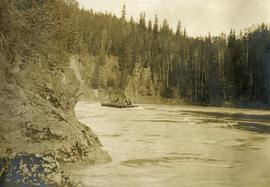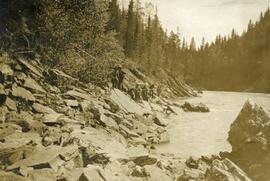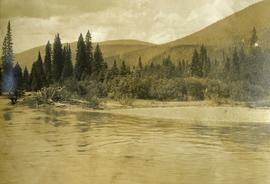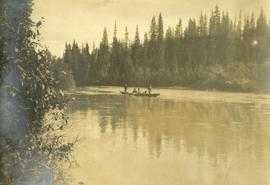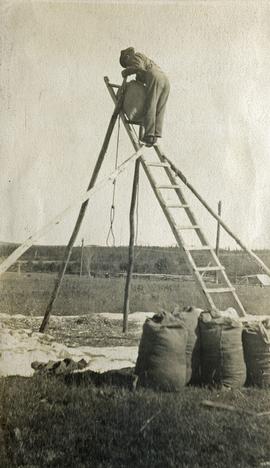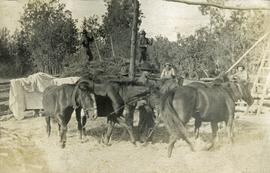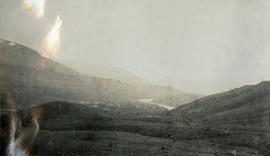Item is a photograph of a stack of saw logs.
Item consists of a letter documenting Johns McCormick’s experiences at Williams Creek in Barkerville during the winter of 1869. He describes the poor gold mining conditions on Williams Creek and his hopes for future prosperity.
Item consists of a letter written by John McCormick to a person named James; it is not made clear if James is a friend or relative. In both his letter to James, John McCormick makes several references to Victoria. His familiarity with Victoria suggests that he may have travelled from Victoria to Barkerville to mine for gold. In his letters to James, John McCormick describes having no money and living under poor conditions. He mentions the great fire that swept through Barkerville and that he lost nothing due to its distance from his house. McCormick also mentions that the Indians are dying quickly of Small Pox in Victoria.
Photograph depicts a cannery on pilings with a body of water in the foreground and houses and trees in the background.
Photograph depicts cannery buildings on pilings with a body of water in the foreground and a deforested area behind the shoreline.
Photograph depicts three men fishing in a boat with a cannery and wooden buildings along the forested shoreline in the background.
Photograph depicts a line of cannery fishing boats being towed across the water with the base of a mountain in the background.
Photograph depicts a cannery on pilings over the water with other cannery buildings in the background.
Photograph depicts cannery buildings on pilings with a body of water in the foreground and tree covered mountains in the background.
Photograph depicts several cannery buildings on pilings with water in the foreground and a forested area in the background.
Photograph depicts a view of cannery buildings from the shoreline with mountains in the background.
Photograph depicts a building under construction with wood planks on the dock in the foreground and a forested area in the background.
Photograph depicts three men standing behind salmon hung to dry on a wooden deck. Annotation on recto of photograph states: ""Spring Salmon" Rivers Inlet, B.C"
Photograph depicts a tug boat hauling a line of small fishing boats across the water with a mountain in the background. Annotation on verso of photograph states: "Tow of Cannery Fishing boats"
Photograph depicts a man in a fishing boat in front of a line of fishing boats being towed by a tug boat on the water with the base of a mountain in the background.
Photograph depicts a cannery on pilings with a body of water in the foreground with a forested area in the background.
Photograph depicts cannery buildings on wooden pilings with a body of water in the foreground and a forested area in the background.
Photograph depicts wood planks piled on a dock with wood buildings built along the shoreline of the background.
Photograph depicts a cannery on wood pilings with several other buildings along a forested shoreline with a body of water and boat in the foreground.
Photograph depicts a two men standing on piles of whale bones at a whaling station. Annotation on verso of photograph states: "Pile of whale bones, Whaling station, Vancouver Is."
Photograph depicts two men seated in front of a row of hanging fish.
Photograph depicts several log booms on the water with a forested area in the foreground.
Photograph depicts piles of wood planks and log booms in the foreground with a waterfall in the background.
Photograph depicts a man standing on the deck of a sailboat with a view of a cannery along the shoreline of Ocean Falls with mountains in the background.
Photograph depicts a distance perspective of several cannery buildings with a body of water in the foreground and a mountain range in the background.
Photograph depicts three men at a whaling station with debris on the ground and a large elevated tank in the background.
Photograph depicts several fishing boats on the water with a wooden dock in the foreground to the left of the image.
Photograph depicts a cannery in front of a forested mountains with water in the foreground.
Photograph depicts a cluster of canvas tents on the edge of an alpine meadow.
Five unidentified miners pose for a photo. Logs and wood scraps in foreground, forest in background.
Printed annotation on recto of photograph: "PLACER MINING, ATLINTOD RIVER, ATLIN, B.C. A.C. HIRSHFELD NO. 753."
Photograph depicts a cluster of tents on the edge of a meadow. Four or more people stand or sit amongst the tents. Smoke rises from a wood fire and drifts amongst the stub alpine trees in the background.
Group of five miners stand in mining area on left. Woman, man, and young girl sit and stand on far right in more formal attire. Mining tools and equipment throughout.
Printed annotation on recto of photograph: "Société Minière de B.C., Atlin B.C. July 28th, 1901, A.C. Hirschfeld, No. 707".
Photograph of a team of horses pulling a large load of logs. Several men are posed around the sleigh. Printed annotation on recto reads: "Eagle Lake Spruce Mills, Giscome, B.C." Handwritten annotation on verso reads: "4/ This is them after loading. You will observes that this four horse team has two loads, each sleigh has 14 ft banks[??] and is loaded with about 5 thousand feet of logs. In one camp they have a cattepillar[sic] tractor that takes as high as eight sleighs from the bush to the loading [??]. Will try and get you a picture for you. Elizabeth has has very poor health since last March. May have to change residences befor[sic] long very poor doctor here."
Photograph depicts the Seton Lake hatchery building constructed by the British Columbia provincial government in 1903.
Additional photographs and information about this construction is provided in the Fisheries Commissioner's Report for that year:
"In October, 1902, bids were invited for the construction of a hatchery building and Superintendent's cottage on Lake Creek, the outlet of Seton Lake, near the village of Lillooet. There were six bidders. A contract was let to W. Duguid, of Lillooet, the lowest bidder, in November. The buildings were completed and accepted in March, 1903. The hatchery building is a substantial wooden structure 210 feet long by 40 feet wide. The roof is supported by the walls, thus giving a clear floor space for the 160 hatching troughs, which are each 16 feet long, 16 inches wide and 7 inches deep. Two troughs are placed end to end and extend the width of the building, and receive the water from the head flumes which run lengthwise of the building. The equipment permits of the handling of forty million eggs. The water supply is taken from Lake Creek at a point some 1,400 feet from the hatchery, and about the same distance from Seton Lake, by means of a wooden flume three feet wide and two feet deep. A comfortable cottage for the Superintendent and a boarding-house for the other employees were constructed and furnished. The station in all its equipment is modern, and is not excelled by any other on the coast..."
Hatchery operations were terminated in Seton Creek in 1915 because the salmon runs had been almost destroyed.
Photograph depicts man (presumably A.H. Holland) with survey pole standing next to loaded pack horse.
Photograph depicts five men standing in a field of cut hay. Some men are holding scythes, buildings, forest and rolling hills in background.
Photograph depicts rolling hills with dry vegetation and river in the background.
Photograph depicts a team of four horses harnessed to a wagon loaded with freight and people.
Photograph depicts a view possibly from a stage coach, fences and rolling hills with dry vegetation in the background.
Photograph depicts buildings, field, and fenced areas with forest in the background.
Photograph depicts 5 men in a field using scythes to cut grain.
Photograph depicts a scow loaded with three or more pack horses with men attending. The scow is crossing the river, guided by a cable. There is one building, and forest in the background.
Photograph depicts several horses enclosed in log a large log carrel. Horses are loaded with packs, three or more persons appear to be unloading them.
Photograph depicts several men on a long scow loaded with supplies amidst swirling deep river water.
Photograph depicts several men on the river's edge pulling on a long rope attached to a large scow downstream.
Photograph depicts a river, riverbank, forest and treed rolling hills.
Photograph depicts a scow with several men in the center of a river.
Photograph depicts a man standing on a high ladder pouring grain from a sack to a tarp below. Sacks of grain in the foreground, field and trees in the background.
Photograph depicts six horses harnessed to a center pole. Three men attend the horses, two men with pitchforks stand atop a wagon loaded with cut grain stocks in the background.
Photograph depicts rolling hills with dry vegetation and river in the background.
